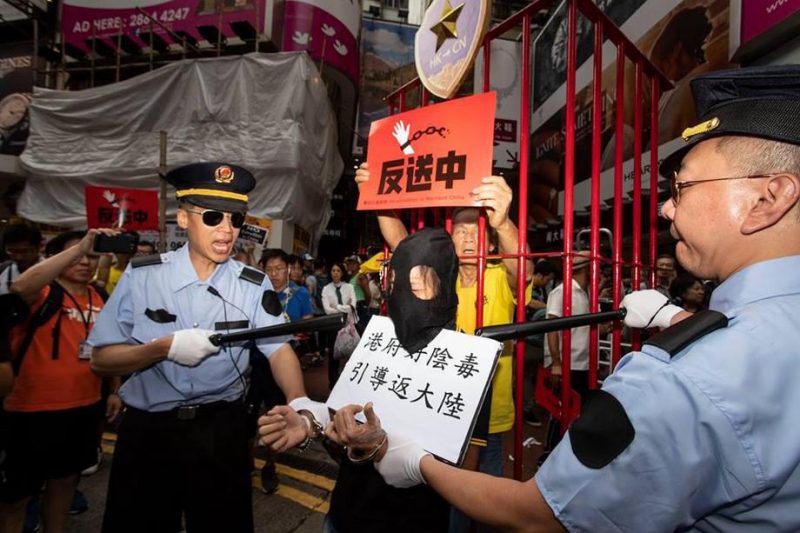The original version of the following post was written by Tom Grundy and published in the Hong Kong Free Press on August 3, 2021. The following edited version, with additional quotes from the report from Stand News, is published on Global Voices under a content partnership agreement.
Political artist Kacey Wong has left Hong Kong for Taiwan citing the shrinking space for artistic expression.
The 51-year-old left the city 17 days ago and posted a farewell message and video on social media on August 3 after completing his COVID-19 quarantine in Taichung.
‘When you received this letter, I have already left. Leaving is not easy, staying is also difficult. We have known each other for 51 years, I will not forget you. Let’s treasure each other, goodbye Hong Kong,’ he wrote on Facebook, with music and quotes from Vera Lynn’s ‘We’ll Meet Again’.
Wong said that he needed to be strategic and tactical in his decision to leave: ‘For me, the critical moment for the decision to leave was the [arrest of the] 47′. he said in reference to January’s round-up of election hopefuls. ‘For me, that is a signifier for the destruction of Hong Kong’s law system as we know it’.
He also cited a piece on the front page of the China-run Ta Kung Pao newspaper in February which criticised him and other media persoanlities. He said he perceived the piece as a ‘wanted list’ for Beijing.
The article mentioned 17 individuals from the independent film and art industries accusing them of glorifying the 2019 anti-China extradition protests and the Hong Kong independence movement. The report noted that Wong attended a TED talk in Vienna on October 21, 2019, where he presented the protests as a ‘revolution’ through his public artwork on the 2014 pro-democracy Occupy Central movement and the 2019 protests.
Wong described his departure as a painful process similar to a retreating from a battle or attending one's own funeral. He said that was very nervous when he was in the Hong Kong airport because he anticipated that he might be included on the national security police's ‘wanted list’. He told the Stand News:
最恐怖的是移居者好像要『以身試法』去闖關,究竟自己在不在黑名單上?會不會執好行李卻在關卡亮起紅燈?出境是否能夠過關是好大的賭博…決定離開就做好永遠不能回港的心理準備;同時也預備好萬一過不了關,將會被捕、坐監、面對長時間審訊,這都是必須準備。
The most terrifying part is that you did not know if you were really on the arrest list. Would the red light turn on when you were in front of the emigration desk? Whether you could manage to leave the city is like a gamble… Psychologically you have to prepare that you can never return back to Hong Kong and that if you were stopped during the emigration, you could be arrested, jailed and face a very long trial.
An Apple Daily journalist, Fung Wai Kong, was arrested on June 28, 2021 in the Hong Kong airport when he attempted to leave the city during the police crackdown on the news outlet.

Kacey Wong's public art performance during the anti-China extradition protests in 2019. Photo from Kacey Wong via Stand News.
Last June, the artist was more optimistic about the Beijing-enacted security law, telling HKFP that the legislation will only galvanise creativity in Hong Kong.
However, he said he did not foresee the severity of the crackdown: ‘The biggest question is what do I need? Why do I leave? And it’s very obvious… the freedom of artistic expression’, he said. ‘I want and I demand 100 per cent freedom, with no compromise’.
Since the 2014 pro-democracy Umbrella Movement, Wong sought to push the boundaries of art as a means of political dissent on the streets and was often seen at the July 1 democracy protests. His 2018 performance piece, ‘The Patriot’, shows him playing the Chinese national anthem on an accordion from inside a red cage outside the Chinese Government complex of Hong Kong.
Whilst many Hongkongers are emigrating to the UK, Wong said he specifically chose Taiwan for its vibrant art scene which offer opportunity for growth: ‘I always appreciated Taiwan’s culture and art, I think it’s very mature and deep and the society is sophisticated and raw at the same time, which I like’.
He told the Stand News that he would take it as his duty to voice out for Hongkongers and he advised those who continued to stay in Hong Kong to keep a low profile and be more creative in their expression:
所謂香港的新時代,將會有新方法,舊方法已經不再有效。如果我們繼續迷戀以往的舊方法,其實是一種偏執。我們必須要有創意去面對政治的潰壞的新時代。
Under the so-called New Era, we need to adapt to a new way [of expressing ourselves], the old way can't work anymore. We can't be obsessed with the good old days. We have to be creative to face the rotten politics of the New Era.
In March, Chief Executive Carrie Lam vowed to put the city on ‘full alert’ against artwork deemed to be endangering the city’s national security in government-funded spaces.
In June 2020, Beijing inserted national security legislation directly into Hong Kong’s mini-constitution — bypassing the local legislature — following a year of pro-democracy protests and unrest. It criminalised subversion, secession, collusion with foreign forces and terrorist acts, which were broadly defined to include disruption to public transport and other infrastructure. The move gave police sweeping new powers, alarming Democrats, civil society groups and trade partners, as such laws have been used broadly to silence and punish dissidents in China. However, the authorities say it has restored stability and peace to the city.





